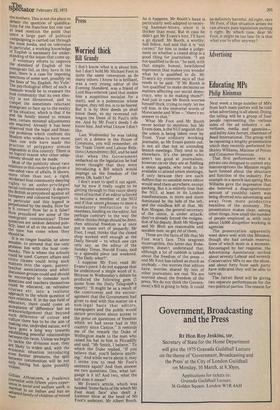Press
Worried thick
Bill Grundy
I don't know what it is about him, but I don't hold Mr Michael Foot in quite the same veneration as do many others. I know he is brilliant, was a very young editor of the Evening Standard, was a friend of Lord Beaverbrook (and that makes him a suspicious socialist for a start), and is a polemicist whose tongue, they tell me, is to be feared. But it is by their deeds ye shall know them, so my reverend colleague the Dean of St Paul's tells me. And by Mr Foot's deeds I do know him. And what I know I don't like.
Last Wednesday he was taking part in a debate in the House of Commons, you will remember, on the Trade Union and Labour Relations (Amendment) Bill, and he said that when the Government embarked on the legislation he had never thought that they were introducing a Bill which would impinge on the freedom of the press. Oh, hadn't he? • I don't want to spell it out again, but by now it really ought to be getting through to that razor-sharp mind of his that if an editor is forced to become a member of the NUJ and if that union ;hooses to issue a mandatory instruction to its members, binding on the editor, but perhaps contrary to the way the editor thinks things should be done, then editorial freedom is at once put in some sort of jeopardy. Mr Foot, I read, thinks that the closed shop worked well enough at the Daily Herald – to which one can only' say, as the editor of the Sunday Times, Harold Evans, said in a splendid piece last weekend, "The Daily what?". I suppose Mr Foot read Mr Evans's piece. I do not suppose that he understood a single word of it. Because in Wednesday's debate he produced the following gem_ (I quote from the Daily Telegraph's report): "It might be as a result of the controversy and the encouragement that the Government had given to deal with this matter on a non-legal basis that editors, newspapers and the public would secure provisions about access to the press on questions of freedom which we had never had in this country since Caxton." It reminds' me of the remark the Duke of Wellington made to the man who raised his hat to him in Piccadilly and said, "Mr Smith, I believe." To which the Duke replied, "If you believe that, you'll believe anyth ing." And while we're about it, may I invite you to read Mr Foot's sentence again? And then answer me two questions. One, what language is it in? And two, what the hell does it mean?
Mr Evans's article, which was headed 'Some facts of life which Mr Foot must face' also dealt a hammer blow at the head of Mr Foot's assistant, Mr Albert Booth. As it happens, Mr Booth's head is particularly well-adapted to receiv ing hammer-blows, since it is thicker than most. But in case he didn't get Mr Evans's hint, I'll have a go myself. Mr Booth, a worthy, dull fellow, had said that it is "not correct" for him to make a judge ment on whether a closed shop is a good thing for journalism. "I am not qualified to do so," he said, with that simple, honest, bewildered expression that makes you wonder what he is qualified to do. Mr Evans's icy comment says all that needs to be said: "If Mr Booth is 'not qualified' to make decisions on matters affecting our social democracy, why is he making them" And just in case Mr Booth worries himself thick, trying to reply, let me tell him, in the immortal words of Morecambe and Wise – "there's no answer to that."
What Mr Foot and Mr Booth never bother to mention, but Mr Evans does, is the NUJ anguish that the union is being taken over by Trost. Your ordinary working journalist, as Mr Evans points out, is not all that hot at attending branch meetings. They tend to be elsewhere. It's the people who aren't too good at journalism, however clever they are at fiddling a union agenda, who tend to be available to attend union meetings, if only because they are such duffers that no sensible news editor would send them anywhere, except packing. But it is entirely true that the NUJ, at least in its London manifestations, is more and more dominated by the lads of the left, and the mindless left at that. Mr Ken Morgan, the general secretary of the union, is under attack; they've already forced the resignation of his deputy. Both Mr Morgan and Mr Blott are reasonable and sensible men: so get rid of them.
These are the facts of life that Mr Foot won't face. This seagreen incorruptible, this latter-day Robe spierre, doesn't understand that, although a lot of rubbish is talked about the freedom of the press – and Mr Foot has talked as much as anybody – the worries that editors have, worries shared by lots of other journalists, are real. We are 'worried about the freedom of the press. We do not think the Government's Bill is going to help. It could be definitely harmful. All right, says Mr Foot, if that situation arises we can always pass legislation putting it right. By which time, dear Mr Foot, it might be too late. Or is that what you're after anyway?


































 Previous page
Previous page